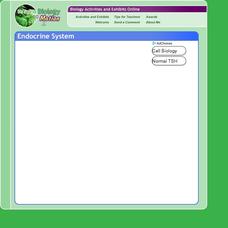Biology in Motion
Urine Concentration in 3 Easy Steps
The color, density, and smell of urine all relate to kidney function. Pupils observe the kidney controlling the concentration of water through three different steps. It mentions how each function might change the appearance and scent of...
Biology in Motion
The Cardiovascular System
When resting, blood goes from the heart to the lungs and back in about six seconds. An animation of the heart starts simply by showing blood flow through the two halves. It builds in complexity slowly over the course of five slides,...
Biology in Motion
Thyroid Gland and Negative Feedback
Many glands work together to control hormone levels in the body. The interactive focuses on the thyroid gland, pituitary gland, and the hypothalamus. It demonstrates the interconnections and feedback loops present in the endocrine system.
Biology in Motion
Organize-It
Many pupils struggle to categorize and organize related content. Multiple quizzes on a variety of topics offer practice for these specific skills. Scholars move items around until they think each is placed in the proper position....
Biology in Motion
Evolution Lab
Evolution occurs though change over time, but can it go any faster? Scholars speed up the process of evolution and observe a simulation of 20 blue organisms fighting for survival. A graph displays the changes in phenotype over time. By...
Biology in Motion
ATP and Energy Storage
Young children often appear to have endless amounts of energy. The interactive describes where energy comes from and how bodies turn food into a usable energy source. The comparison of ATP to a rechargeable battery helps pupils remember...
Biology in Motion
Fat Digestion and Bile
Understand the role of bile in fat digestion with the help of a simple animation. The short interactive explains why fats are difficult to break down and how bile assists lipase in maintaining a healthy system.








